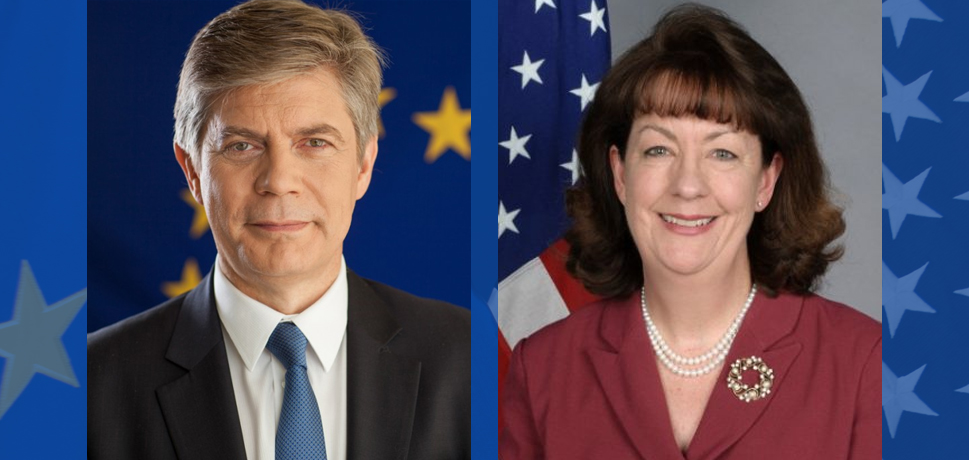
BiH politicians need to do their job
Authors: United States Ambassador to BiH Maureen Cormack and Ambassador Lars-Gunnar Wigemark, Head of the EU Delegation and EU Special Representative in BiH With just weeks before general elections ar...
Authors: United States Ambassador to BiH Maureen Cormack and Ambassador Lars-Gunnar Wigemark, Head of the EU Delegation and EU Special Representative in BiH
With just weeks before general elections are announced, Bosnia and Herzegovina’s (BiH) leaders are running out of time. There is agreement that reforms are needed. What is missing is the political will to negotiate a compromise. As citizens of a democratic country, the people of BiH have the right to expect that elections are held and the results implemented.
We are deeply concerned that BiH’s leaders have abdicated their responsibility and do not take seriously the risk of a political crisis. This is unacceptable. If the results of the general elections cannot be implemented, the establishment of authorities will be seriously hindered. This will have negative consequences for every single citizen. Why? Because it is these institutions that pass the budget, and from that budget, public services such as water, heating, schools, health care, and pensions, are paid. Without a functioning government, societal and economic ramifications will follow.
The need for compromise
BiH’s leaders have both the responsibility and the ability to forge a compromise. We have confidence that one day, BiH will take its rightful place in the EU and NATO. Therefore, challenges must be met with local solutions, not imposed ones.
Guaranteeing a secure and stable environment is what politicians are elected to office to do, and it will take compromise on all sides to deliver. We stand ready to continue supporting meetings between parties, and to share our legal expertise. A solution can be achieved. The key is political will, and that must be provided by each and every leader in BiH.
What should citizens reasonably expect and demand from their political leaders? In a functioning democracy, citizens have the right to elect their leaders and are entitled to a functional government, formed after elections. Political leaders must reach agreement on the minimum changes necessary to hold and implement results from the October elections – to resolve the question of how the Federation House of Peoples (FHoP) is formed, taking into account the decision of the BiH Constitutional Court in the Ljubic case and the existing legal framework.
What did the Ljubic case decide?
In December 2016, the Constitutional Court of BiH issued a ruling that some language in the BiH Election Law was inconsistent with the BiH Constitution, since it led to over and under-representation of certain ethnic groups in certain areas. The Constitutional Court gave lawmakers six months to make the changes necessary to address this problem. In July 2017, after Parliament failed to act, the Constitutional Court intervened, deleting two sections of the Election Law. The Constitutional Court’s action, while justified by Parliament’s inaction, left a gap in the Election Law’s provisions on the allocation of seats to the FHoP. It is up to the political parties to find a lasting solution, in line with the Ljubic ruling’s call for more proportional representation, which would enable formation of the FHoP. This will require amendments that strike a balance between proportional representation, given the FHoP’s role in protecting the rights of each constituent people, and broad geographic representation, because the FHoP, like the Federation House of Representatives, has full legislative authority. The parties have discussed a number of viable options but have thus far refused to compromise.
What else should be done?
There are other changes that should be made now to ensure that institutions function democratically. For example, the Serb Caucus in the FHoP, which should have 17 members, at present has only 13 members. The Bosniak and Croat caucuses have their full 17 members, and Others have their full seven members. All parties have expressed a willingness to make changes that ensure the three constituent peoples, including Serbs, are fully represented in the FHoP – a good example of how the parties can compromise, when they want to. Parties should also address the electoral impasse in Mostar, where elections have not been held since 2008. This is completely unacceptable in a country moving along the European path. Finally, political parties should take the opportunity to make changes to improve the credibility and transparency of the election process based on recommendations from the OSCE’s Office of Democratic Institutions and Human Rights (ODIHR) following the 2010 and 2014 general elections.
The European Court of Human Rights (ECtHR) has made several determinations that BiH’s leaders have ignored for too long. One addresses election to the BiH three-member Presidency, but parties cannot agree how to interpret that decision, and time is short. A solution on the Presidency that does not address the relevant rulings of the ECtHR would represent a step backward on BiH’s path toward the EU and NATO. The ECtHR also requires changes to the BiH House of Peoples, and there are other changes which could improve the political system of this country, to serve citizens better. But parties must focus first on urgent priorities, including the FHoP and Mostar, and wait until after the election to address other questions, including the Presidency, in line with relevant ECtHR and Constitutional Court rulings.
Why does this matter?
Electoral reform is an important issue, one that directly affects how citizens are represented, and who gets to lead the country. Now is not the time for parties to double down on entrenched positions that undermine BiH’s progress. Now is the time for leaders to lead, through compromise. Failure to resolve these issues will have serious negative consequences and undermine BiH’s efforts to move forward. Successful democracies are built on accountable institutions and respect for the people’s will. Political leaders’ unwillingness to rise above narrow interests sends the message that BiH’s elected representatives only believe in democratic norms when they are politically convenient. It is, after all, the citizens of BiH who empower politicians to represent them, and they can – and should – hold their elected officials to account.
Electoral reform is complicated. But to safeguard against a political or economic crisis, to secure a fairer system of representation, to move BiH to be more in line with European standards and to protect the citizens of BiH, the compromise is worth it.
Let’s get to work.
